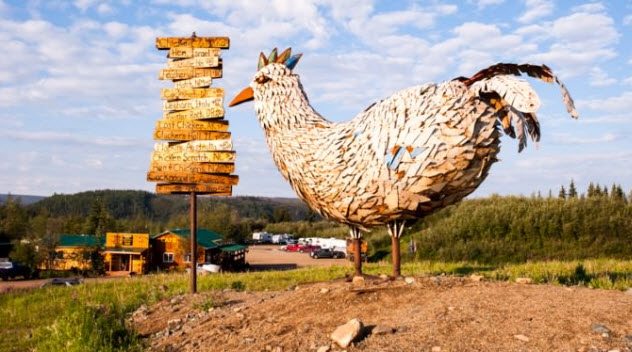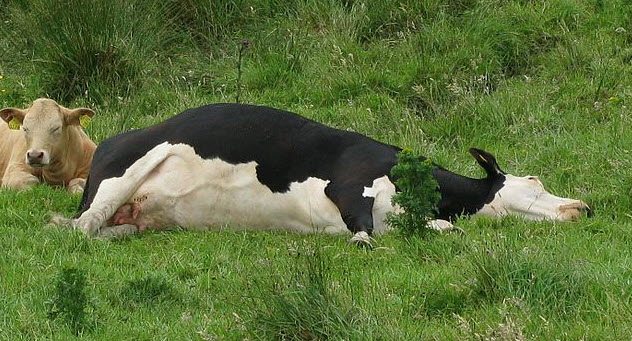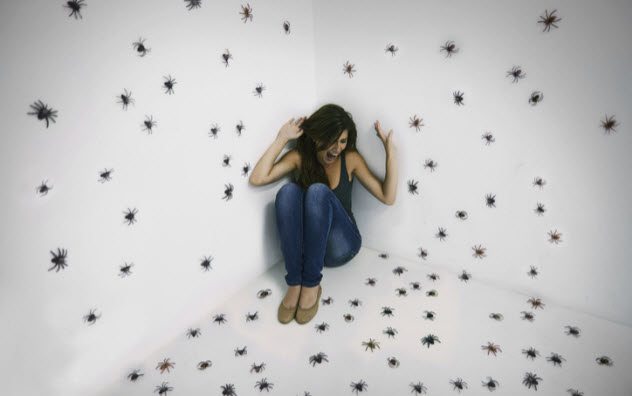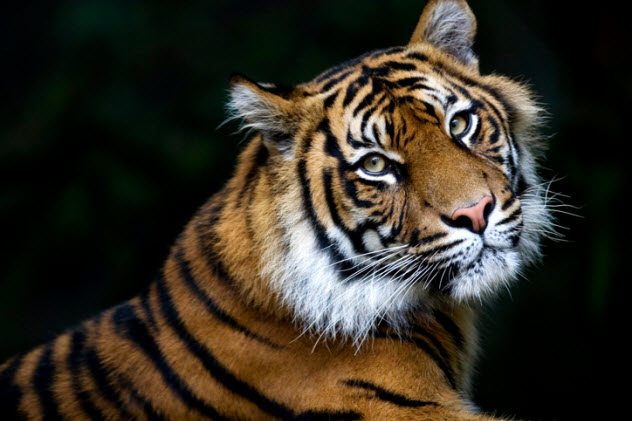 Travel
Travel  Travel
Travel  Movies and TV
Movies and TV 10 Actors Hidden in Your Favorite Movies
 Our World
Our World 10 Science Facts That Will Change How You Look at the World
 Pop Culture
Pop Culture 10 Incredible Female Comic Book Artists
 Crime
Crime 10 Terrifying Serial Killers from Centuries Ago
 Technology
Technology 10 Hilariously Over-Engineered Solutions to Simple Problems
 Miscellaneous
Miscellaneous 10 Ironic News Stories Straight out of an Alanis Morissette Song
 Politics
Politics 10 Lesser-Known Far-Right Groups of the 21st Century
 History
History Ten Revealing Facts about Daily Domestic Life in the Old West
 Weird Stuff
Weird Stuff 10 Everyday Products Surprisingly Made by Inmates
 Travel
Travel 10 Natural Rock Formations That Will Make You Do a Double Take
 Movies and TV
Movies and TV 10 Actors Hidden in Your Favorite Movies
 Our World
Our World 10 Science Facts That Will Change How You Look at the World
Who's Behind Listverse?

Jamie Frater
Head Editor
Jamie founded Listverse due to an insatiable desire to share fascinating, obscure, and bizarre facts. He has been a guest speaker on numerous national radio and television stations and is a five time published author.
More About Us Pop Culture
Pop Culture 10 Incredible Female Comic Book Artists
 Crime
Crime 10 Terrifying Serial Killers from Centuries Ago
 Technology
Technology 10 Hilariously Over-Engineered Solutions to Simple Problems
 Miscellaneous
Miscellaneous 10 Ironic News Stories Straight out of an Alanis Morissette Song
 Politics
Politics 10 Lesser-Known Far-Right Groups of the 21st Century
 History
History Ten Revealing Facts about Daily Domestic Life in the Old West
 Weird Stuff
Weird Stuff 10 Everyday Products Surprisingly Made by Inmates
Top 10 Strangest Wikipedia Edit Wars
Wikipedia is the site that has helped many people with a tough piece of homework. It’s a place loved by students but hated by teachers. A place that contains so much information that it would take 17 years of constant reading just to get through the English portion of the site. A place that anybody can edit—whenever, wherever, or whoever they are.
However, you probably don’t know that hidden battles occur every day all over the site to make sure that the information stored is not ruined. These “edit wars” are undertaken by those who believe it is their duty to protect certain articles on Wikipedia. They follow one simple rule: To keep the information consistent with how they want it to be.
10 Cuteness

What is cuteness? Is cuteness a survival technique, or is an animal’s cuteness based on opinion?
A variety of scientific studies have found that young animals look especially cute so that others are more likely to care for them. Dogs have specifically been bred by humans to be cute. For certain dog species, cuteness has been proven to be an effective way to pass their genes to the next generation.
But many would argue that the survival argument isn’t true and that cuteness is based on your own viewpoint. Surprisingly, this debate has caused around 22,000 total edits to the cuteness page by Wikipedia’s tireless editors. They have either added or removed words that discussed the survivability of cute animals.[1]
9 Chicken, Alaska

You would think that the population of a small village would not be a hot topic among Wikipedia’s volunteers, but around 9,000 edits have been made to the page about this tiny town in Alaska. The main disagreement concerns the 2000 census, which stated that only 17 people lived there. Eight were children (or chickens, as one editor wrote).
One editor aggressively argued that this is correct, as the statement that “for every 100 females there were 88.9 males . . . [is] absurd nonsense from an outdated source. [ . . . ] There are SEVENTEEN PEOPLE IN THE VILLAGE, for f—k’s sake.” Meanwhile, another editor argued that “forcing in meaningless statistics from a decade and a half ago is vandalism.”[2]
As of early 2018, it seems that the warring editors have an uneasy truce. The Wikipedia page states that there were seven residents at the time of the 2010 census. But year-round, there are usually 17 inhabitants due to the mining in the area.
This may seem trivial to many. But luckily for the rest of us, there are some who want to keep this small town’s population updated and accurate.
8 Star Trek InTo Darkness?

The release of Star Trek Into Darkness was received with criticism by Star Trek fans despite making over $450 million in worldwide revenue. So you would probably expect that the Wikipedia editors argued about how the film was received by the audience, but that assumption would be wrong.
The real edit war concerned something much more trivial—the capitalization of “into” in the title. All the official media released by those behind Star Trek into Darkness had the word “into” capitalized, which led to a long battle between Wikipedia editors over whether the word should be “Into” or “into.” Believe or not, there were around 3,000 edits over this seemingly trivial point.[3]
The debate appeared to be over for a while when the editors agreed to use “InTo.” But this truce seems to have ended now, with the current title on Wikipedia being Star Trek Into Darkness.
7 Cat

Cats are one of humanity’s favorite pets and are loved by many people across the world. But what is the proper way to refer to the relationship between a human and his cat? This is a topic of hot debate among the Wikipedia editors.
The groups argue about the “power” dynamics in the human-cat relationship. Some maintain that the human “owner” is in charge of the relationship. Others contend that the cat holds all the power, with the human performing the role of “caregiver.”[4]
The final side of the debate is probably the most hopeful. It asserts that the relationship is a companionship with benefits on both sides and that the human assumes the role of a “human companion.” So far, this argument has caused around 11,000 edits, a significant number for the simple cat.
6 Iron Maiden

Everyone has heard of the band Iron Maiden, which rose to fame in the early 1980s. They have released several platinum and gold albums in the US and UK and have sold over 100 million albums worldwide. So you wouldn’t expect any arguments about the band’s popularity.
You would be wrong, although there’s a twist to the debate. It’s over whether the band is more famous than the horrific torture and execution device known as the iron maiden. The first cited use of this device supposedly occurred in the 16th century, although it’s debatable whether this instrument of torture really existed.[5]
Nevertheless, the Wikipedia editors are squabbling over whether the main page for “Iron Maiden” should be about the band or the torture device. The torture device is certainly more brutal. However, some people believe that the band is full of Satan worshipers since their release of the song “The Number of the Beast.” Allegedly, it is a satanic chant when played backward. Then again, what heavy metal song isn’t?
This disagreement has resulted in around 9,000 edits to where the link “Iron Maiden” leads. It is still changed frequently, so searching for “Iron Maiden” could bring you to either page.
5 Mathematics

Here’s a little-known fact: Clicking the first link outside of brackets on any Wikipedia article will normally lead you to philosophy. You can try it yourself. Go to any page, and you will find that clicking the first link will usually lead all the way back to philosophy. This is true for most pages on Wikipedia except mathematics and three of its first four links.
This has produced a multiyear edit war over how the first four links (which go to pages on quantity, change, structure, and space) should be ordered so that the mathematics page eventually goes to philosophy. The article that leads to philosophy is “space.” To play the “every link leads back to philosophy” game, “space” should be the first link on the mathematics page.[6]
However, some people argue that manually changing the links to make sure that philosophy is first ruins the integrity of the game, so they restore the original order of the links. This has led to a countless number of edits to the mathematics page over many years.
4 Cow Tipping

Cow tipping is the pushing over of an unsuspecting or sleeping cow for fun. It is supposedly a fun hobby for those who live in rural areas. But it is likely to be a myth because pushing a cow onto its side would require around 1,360 newtons of force. This is approximately equivalent to the force that 4–5 people could put out, but you would likely need more than that.
However, the edit war over this one is not about the truthfulness of the statement. Instead, the editors are feuding over the caption that accompanies the picture on the page. Certain people believe that the cow should be referred to as “an unsuspecting potential victim.”
In 2006, Psychonaut3000 (an editor of this page) stated that the cow is unsuspecting as it has no knowledge of cow tipping activities. Also, the cow is a potential victim as there is nothing to suggest that the cow is immune to being tipped. A reasonable point, but it has been argued back and forth more than 2,000 times![7]
3 Arachnophobia

This page only has around 1,600 edits, but the nature of the edit war warrants its inclusion on this list. Arachnophobia (the fear of spiders) is the third most common phobia in the US, with 30.5 percent of the population reporting that they are afraid of spiders. It is behind only glossophobia (fear of public speaking) and necrophobia (fear of death) for most common phobias in the US.
For the arachnophobia page, the argument concerns whether a large picture of a tarantula should appear on the page. Some suggest that a page frequently visited by arachnophobes should not contain a picture that scares them. However, others contend that the picture should be visible to maintain the integrity of the website. Instead of removing the spider picture, these editors believe that it would be simpler for arachnophobes to turn off images in their browsers.[8]
2 Jesus

Whether you are Christian or not, most people know that Jesus was born in the year 4 BC according to the Bible. The argument on the Jesus page occurs on any Wikipedia page with a date, and that is whether to use BC/AD or BCE/CE. (At Listverse, we use BC and AD.)
As this subject is hotly debated on Wikipedia, there have been approximately 20,000 edits on the Jesus page alone. Although many votes have taken place to decide which side is right, the current agreement, at least on the Jesus page, appears to be on the BC/AD side at the time of this writing.[9]
1 Tiger Or Lion?

Which is the most powerful cat? The tiger or lion?
Seemingly a question that would normally be limited to playgrounds, this argument rages on the Wikipedia page for tigers, too. This has led to much annoyance on both sides. One editor, JBoyler, stated that they should “let the tiger’s actions speak for themselves” and that all those who argue that a tiger is the most powerful cat should “grow up” and stop ruining the page with “childish tantrums and quibbling.”[10]
Some of the Wikipedia editors are not happy with simply comparing the tiger to the lion. They like to add to the page that tigers are also likely to be successful in battles against brown bears.
For more crazy stories about Wikipedia pages, check out 10 Interesting And Unusual Wikipedia Articles and Top 15 Funny and Bizarre Wikipedia Pages.








